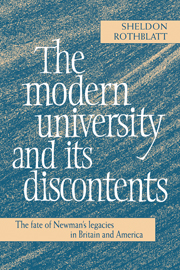Book contents
- Frontmatter
- Contents
- Preface
- 1 The idea of the idea of a university and its antithesis
- 2 ‘Consult the Genius of the Place’
- 3 ‘The first undergraduates, recognizable as such’
- 4 Failure
- 5 Historical and comparative remarks on the ‘federal principle’ in higher education
- Interlude: General introduction to Chapters six and seven
- 6 Supply and demand in the writing of university history since about 1790: 1. ‘The awkward interval’
- 7 Supply and demand in the writing of university history since about 1790: 2. The market and the University of London
- 8 Alternatives: 1. The importance of being unattached
- 9 Alternatives: 2. Born to have no rest
- Index
6 - Supply and demand in the writing of university history since about 1790: 1. ‘The awkward interval’
Published online by Cambridge University Press: 02 December 2009
- Frontmatter
- Contents
- Preface
- 1 The idea of the idea of a university and its antithesis
- 2 ‘Consult the Genius of the Place’
- 3 ‘The first undergraduates, recognizable as such’
- 4 Failure
- 5 Historical and comparative remarks on the ‘federal principle’ in higher education
- Interlude: General introduction to Chapters six and seven
- 6 Supply and demand in the writing of university history since about 1790: 1. ‘The awkward interval’
- 7 Supply and demand in the writing of university history since about 1790: 2. The market and the University of London
- 8 Alternatives: 1. The importance of being unattached
- 9 Alternatives: 2. Born to have no rest
- Index
Summary
BRINGING A MIND OUT OF THE CLOD
We begin with a fundamental historical problem briefly exposed in the chapter describing the new undergraduate culture of unreformed Oxford and Cambridge. That culture was made possible by a number of confusing transformations in the emotional relationships between the members of families from which the senior universities recruited their students. While we understand that upbringing affects subsequent conduct, precision in such matters evades us. Amongst the more bewildering subjects in the writing of social history, none ranks higher than trying to understand child development in relation to parenting, sibling relationships and the interpenetration of family with other socialising institutions, such as schools, churches, neighbourhoods and voluntary organisations. They are bewildering because the sources of family history are multi-varied and contradictory. Our own understanding of how families function as primary institutions is rent by inconsistencies and controversies, making a sober, consensual analysis quite daunting. The subject was and remains critical because upbringing followed by peer associations has an obvious relevance to present-day social policies respecting abortion, divorce, child abuse, juvenile crime, schooling, teaching and preparation for entry into the labour market, to name only the larger questions currently at issue in most contemporary societies.
The subject is truly vexed. Existing theories about family history, when scrutinised carefully, have not generally stood the test of scholarly review. Dramatic reinventions of childhood in particular centuries are less apparent to some observers than to others.
- Type
- Chapter
- Information
- The Modern University and its DiscontentsThe Fate of Newman's Legacies in Britain and America, pp. 307 - 348Publisher: Cambridge University PressPrint publication year: 1997



